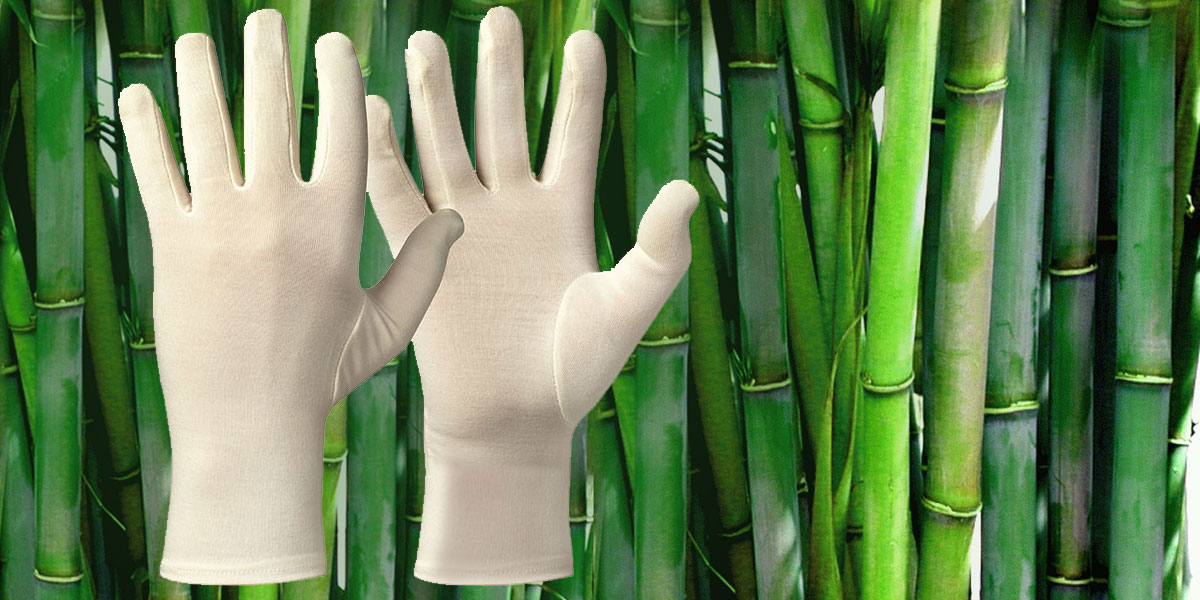Bamboo is one of nature’s most sustainable resources with plants growing around 15 metres tall in only 6 months. Its ability to be processed into fibres allows it to be used in the production of gloves that provide various benefits in comparison to cotton, nylon or polyester alternatives.
Glove usage for eczema
Eczema is a frustrating and sometimes debilitating form of dermatitis. Sufferers face an ongoing battle with itching and inflammation of the skin that can occur anywhere on the body. Eczema is very common and persistent scratching causing the skin to break can lead to bacteria entering the wound, resulting in infection. A common solution to prevent harsh scratching is to apply a pair of soft gloves. By wearing gloves, the skin is less likely to break when scratching occurs as the fingernails are covered. Those with eczema on hands will often apply cream and use gloves as a way of keeping the cream in place on the affected areas of the hands.
The most common gloves purchased by eczema sufferers are made from cotton. Although cotton is a biodegradable natural substance, it is a difficult crop to farm and is particularly vulnerable to pest attacks. Because of this, farmers will use pesticides on a large scale with smallholder cotton farmers spending up to 60% of their annual income on pesticides. Although cotton crop covers just 2.4% of the world’s cultivated land, it uses 6% of the world’s pesticides and 16% of insecticides, more than any other single major crop. The use of pesticides has a devastating effect on the health of those around it and it is estimated that almost 1000 people die every day from acute pesticide poisoning. Cancer, neurological diseases and birth defects are also linked to cotton farm pesticides.
The natural and health-friendly alternative
As opposed to cotton, bamboo is grown without any pesticides or chemicals and is a naturally regenerative resource. Gloves made with bamboo offer substantial benefits to eczema sufferers compared to their cotton, nylon or polyester counterparts. Bamboo gloves are lighter and softer than cotton making them easy to don and extremely comfortable to wear. They are 2-3 degrees cooler than cotton or synthetic gloves and breathable. Bamboo is four times more absorbent as cotton. Small micro-holes help prevent build-up of moisture and improve ventilation to the hands. Unlike cotton, bamboo fibres will not generate bad odours or contribute to the growth of fungi, even in moist conditions.
Sian Gomersall, Head of Business Development at JustGloves, a major online retailer of gloves in the UK, states: “We are seeing a rise in the sales of eco-friendly gloves due to the increased awareness of the devastating effects that chemical usage and pollution is having on our environment. Our customers are looking for gloves that perform just as well, or better than their current glove choices, but cause less damage to the environment. Because of this, we are constantly sourcing environmentally friendly gloves and looking at the latest advancements to add to our extensive product range. This ensures we can meet the needs of our customers and assist the efforts being made to save our planet.
“Bamboo gloves are just one of the eco-friendly glove options available on our website. The gloves offer superior comfort to wearers and can be machine washed at 60 degrees without any reduction in quality or fit.”
To find out more about the range of environmentally friendly gloves currently available, visit
www.justgloves.co.uk/biodegradable

